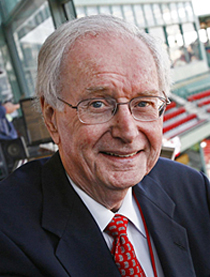
Culture
... there are those nicknames that were the creation of sports writers and headline writers: the Splendid Splinter comes to mind.

Flavin
Mookie Betts has it all. He hits for average (.346 in 2018); hits for power (32 home runs); runs like the wind (30 stolen bases); and is a defensive wizard (3 Gold Glove awards). He also has a great nickname.
He is universally known by the name Mookie and not by his given first name of Markus. Of course, he's not the first baseball player with that moniker. Three decades ago, Mookie Wilson (real name Bill) of the New York Mets became famous (or infamous, depending on your point of view) by hitting a routine ground ball that somehow found its way through the legs of Bill Buckner and into the annals of unforgettable Red Sox disasters of the 20th century. But Mookie Wilson's nickname has nothing to do with that of Mookie Betts.
When little Markus Betts was just an infant in Nashville, Tennessee, his parents used to watch Atlanta Hawks basketball games on television. The Hawks had an estimable point guard named Mookie Blaylock (whose given first name was Daron); that's when they began calling their baby Mookie. The rest is history.
A side note: Blaylock was a very good NBA player (he made an all-star team and several all-defensive teams), but he fell victim to alcohol addiction in his post-playing days. He is currently serving time in prison for manslaughter as the result of his involvement in a fatal automobile collision.
Nicknames have always been a big part of all sports; baseball and the Red Sox are no exceptions. The names fall into different categories. For the purposes of this piece we are not counting commonly used variants of more formal names, such as Tom, Dick, or Harry. There are nicknames that are shortened versions of players surnames, such as Yaz. Pesky was another such nickname given to Johnny Paveskovitch for the simple reason that it fit more easily into box scores; it took hold to the extent that he had his name legally changed in 1947.
Then, there are those nicknames that were the creation of sports writers and headline writers: the Splendid Splinter comes to mind. There are also names that only seem to be nicknames; Spike, for example, is the actual given name of Spike Owen, the Red Sox shortstop of three decades ago. Sometimes a nickname will come about because of a player's ethnicity. When David Ortiz first came to the Red Sox, he didn't know everyone's name so he started calling teammates "Papi," a Spanish colloquialism for "Buddy." They called him the same, adding "Big" because of his size. There are some nicknames that, though they become widely used, never really supplant given names; Rick "Rooster" Burleson and Dave "Boo" Ferriss are two examples. Then, of course, there are nicknames that actually take over from the given names of players; they in fact become part of a player's persona to the point where we don't know or even care what his given name is. Everyone loves Mookie, but most of us aren't aware that he is really Markus Lynn Betts.
A decade and a half ago, the Red Sox had an outfielder who, when he was a little kid, used to be teased by his sister that he looked like one of the characters pictured on the box of Cocoa Krispies cereal. Her nickname for him never really took hold until, as a young player in the low minor leagues, he was asked to fill out a questionnaire used to help familiarize players with one another. Next to "nickname" he filled in "Coco." His teammates thought it was funny, had the name put up on the scoreboard, and from then on he was Coco Crisp. Never again would he use his given first name of Covelli; in fact, like Johhny Pesky, he had his name legally changed in 2013.
Young Elijah Green had no idea why his mother always called him Pumpsie, but she did -- and so did everyone else.
Birdie Tebbetts (George) was the Red Sox catcher in the late 1940s. He got his nickname from his high-pitched voice that, when he'd yell out encouragement to the pitcher, sounded like a bird chirping. He was regarded as a smart baseball man and a great field general (he went on to manage the Reds, Braves, and Indians), but he also had the reputation as the slowest runner in baseball. One day late in the 1949 season, when looking over the Red Sox team statistics, Dom DiMaggio noticed that Tebbetts was leading the team in stolen bases. DiMaggio and Pesky, both terrific base runners, were under orders not to steal when Ted Williams was batting or due up (Dom hit lead-off, Johnny second, and Ted third) because the opposing pitcher would walk Williams, taking the bat out of his hands. Dom approached Tebbetts, explaining what an embarrassment it would be if the slowest runner in the league finished the year leading the team in stolen bases, and asked if Birdie would mind it if he, Dom, stole a few. Tebbetts said not at all, that the only reason he ever stole was that pitchers never bothered to hold him on base and that he would occasionally run down to second because no one was paying attention. Dom stole a few bases in the next couple of games and reported back to Birdie, "I think I've got enough now; besides, Ted is starting to get really teed off."
You could look it up. In 1949, Dom DiMaggio led the Red Sox in stolen bases with nine; just behind him with eight stolen bases was Birdie Tebbetts.
Colorful nicknames were more prominent years ago than they are nowadays. My favorite Red Sox nickname of all time was Baby Doll Jacobson (given name William), who was an outfielder with the Sox and several other teams from 1915-1927. He was a big, muscular guy (6'3" and 215 lb) who looked not at all like a baby doll. The story is that on Opening Day of 1912, while playing for the Mobile Seagulls of the Southern Association, Jacobson, batting lead-off, came up to hit as the band in the stands (a common occurrence in the pre-loudspeaker days) played "Oh You Beautiful Doll." Jacobson homered, and a woman sitting behind home plated yelled out, "You must be that beautiful doll they're playing about."
Memorable monikers add greatly to the enjoyment of all sports. Let's hope that we'll be rooting for Mookie for years to come.
- Dick Flavin is a New York Times bestselling author; the Boston Red Sox “Poet Laureate” and The Pilot’s recently minted Sports’ columnist.
Recent articles in the Culture & Events section
-
'Dignitas' and the mediaRussell Shaw
-
Scripture Reflection for April 14, 2024, Third Sunday of EasterDeacon Greg Kandra
-
St. Helena's House is established in the South EndThomas Lester
-
Is this synodality?Russell Shaw
-
Poking the hornet's nest of IVFFather Tadeusz Pacholczyk


















